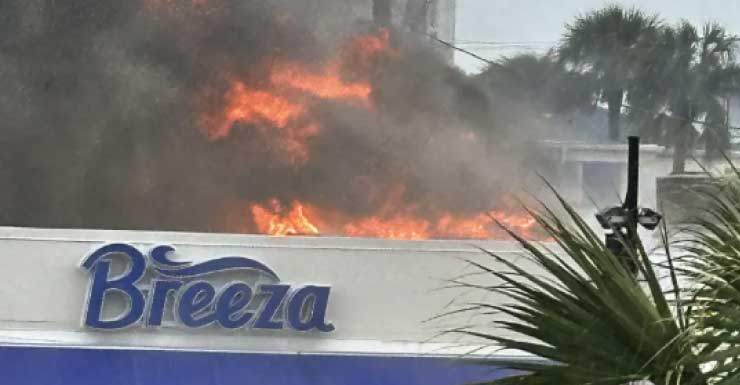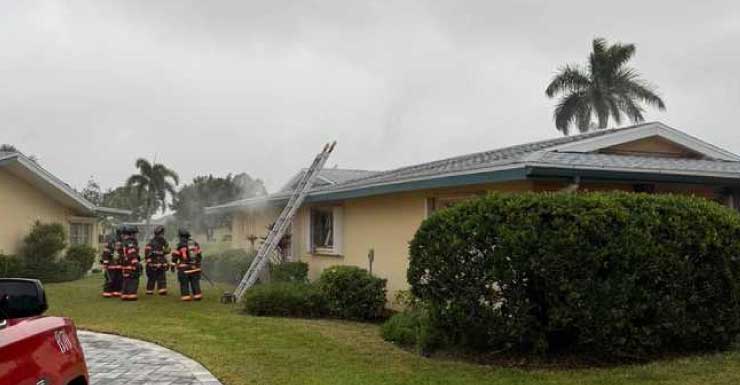18 Fla. L. Weekly Supp. 1042a
Online Reference: FLWSUPP 1810VIGO
Insurance — Personal injury protection — Motion for rehearing is denied — Attorney’s fees — Offer of judgment — Prevailing insurer is entitled to recover attorney’s fees where nominal offer of judgment was made in good faith in view of precedent holding that insurer is not liable for payment of additional benefits after policy limits are exhausted — Justiciable issues — Insurer is not entitled to fee award under section 57.105 where, although insurer placed medical provider on notice that policy limits had been exhausted, there was not complete absence of justiciable issue of fact
VIRTUAL IMAGING SERVICES, INC. (A/A/O YUDI VIGOREAUX), Plaintiff, vs. UNITED SERVICES AUTOMOBILE ASSOCIATION, Defendant. County Court, 11th Judicial Circuit in and for Miami-Dade County, Civil Division. Case No. 10-7543 SP 23 (2). July 1, 2011. Honorable Caryn Canner Schwartz, Judge. Counsel: Charles Kane, for Plaintiff. Reuven T. Herssein, Law Offices of Herssein & Herssein, P.A., North Miami, for Defendant.
[Original Opinion at 18 Fla. L. Weekly Supp. 491a]
ORDER DENYING PLAINTIFF’S MOTION FOR REHEARING AND ORDER GRANTING USAA’S MOTION FOR ATTORNEY’S FEES AND COSTS
THIS CAUSE came before the Court, ex-parte, on Plaintiff’s Motion for Rehearing on the Court’s February 2, 2011 Order Granting USAA’s Motion For Final Summary judgment (Exhaustion of Benefits Issue) and came before the Court on June 1, 2011, for hearing on USAA’s Motion for Attorney’s Fees and Costs.Ruling on Plaintiff’s Motion for Rehearing
The Court reviewed Plaintiff’s said Motion, re-reviewed all applicable file documents, case law and statutory authority provided by the parties and the Court’s notes of the arguments presented by the attorneys for the parties on January 28, 2011. Plaintiff’s Motion For Reconsideration presents no new opinions issued since the date of the January 28, 2011 hearing nor newly discovered evidence which supports Plaintiff’s position. There was no mistake, inadvertence, surprise, excusable neglect, error, nor any manifest injustice.
A Motion For Reconsideration is not to be used as a vehicle to present new arguments, evidence, or authority that had been raised earlier at the hearing on the original motion, and/or raised in a party’s Motion or Response, or to introduce novel legal theories, or to raise the same or similar/familiar arguments, but with a different approach or emphasis, in the hope that the Court will change its mind. This rationale prevents the moving party from having “two bites at the apple”. If this Court, after reviewing Plaintiff’s Motion and after re-reviewing all file documents, case law, statutory authority, etc., felt that her decision was or may be incorrect, for any reason, this Court would have no problem granting Plaintiff’s said Motion and setting the matter for hearing and further argument by the parties. The Court’s February 2, 2011 Order provides a detailed explanation of the reasons for the Court’s ruling. The Court considered all factual and legal matters before rendering her ruling on January 28, 2011.
Accordingly, Plaintiff’s Motion For Reconsideration is DENIED.Ruling on USAA’s Motion for Attorney’s Fees and Costs
This matter came before the Court on June 1, 2011 on USAA’s Motion For Attorney’s Fees and the Court having reviewed Defendant’s Motion, Plaintiff’s Memorandum, Plaintiff’s and Defendant’s proposed orders, the entire Court file, and the relevant legal authorities submitted to the Court for her review; having heard argument of counsel; having made a thorough review of the matters filed on record; and having been sufficiently advised on the premises, the Court Grants Defendant’s Motion For Attorney’s Fees and Costs pursuant to Fla. R. Civ. P. 1.442, and Fla. Stat. §768.79 for the reasons set forth below:Issue
The issue before this Court is whether an insurer, as the prevailing party in a case, is entitled to an award of it’s attorney’s fees and costs, pursuant to Fla. R. Civ. P. 1.442, and Fla. Stat. §768.79, and/or pursuant to Fla. Stat. §57.105.
Findings of Fact
On or about March 29, 2010, Plaintiff filed this lawsuit against USAA for No fault benefits. On May 21, 2010, with its notice of intent to seek §57.105 Sanctions, USAA placed the Plaintiff on notice that all policy benefits available to the claimant had exhausted as of December 22, 2009. USAA, in accordance with Fla. Stat. §57.105, gave the Plaintiff the requisite 21 day safe harbor in which to dismiss the lawsuit, but Plaintiff chose not to do so. Thereafter, on February 11, 2011 — 266 days after serving the Notice of Intent to move for Sanctions — USAA timely filed its Motion for Sanctions Pursuant to, and in Accordance with, Florida Statute §57.105.
On September 16, 2010, USAA served the Plaintiff with a Proposal for Settlement, pursuant to and in accordance with Fla. R. Civ. P.1.442, and Fla. Stat. §768.79, which was not accepted, and therefore, expired.
On February 2, 2011, based on the case law1 on the benefits exhaustion issue,2 this Court granted Final Summary Judgment in favor of USAA. Subsequent thereto, as the prevailing party, USAA timely filed its Motion for Attorney’s Fees and Costs pursuant to Fla. R. Civ. P. 1.442 and Fla. Stat. §§768.79 and §57.105. There is no dispute that the Plaintiff received both the proposal for settlement, and the 57.105 motion, and that USAA met all the technical [service] requirements.
The Plaintiff contests USAA’s entitlement to attorney’s fees and costs pursuant to Fla. Stat. §768.79, alleging that USAA’s proposal for settlement was not made in good faith. They also allege USAA failed to meet the requisite standard for an award of attorney’s fees and costs, pursuant to Florida Statute §57.105.
Legal Analysis
This Court finds that the facts and circumstances of this case entitle USAA to recover reasonable attorney’s fees and costs incurred in defense of the instant suit, in accordance with Fla. R. Civ. P. 1.525, Fla. R. Civ. P. 1.442, Fla. Stat. §768.79.USAA’s Offer of Judgment was made in Good Faith
Florida Statute §768.79 provides in pertinent part:
“(1) In any civil action for damages filed in the courts of this state, if a defendant files an offer of judgment which is not accepted by the plaintiff within 30 days, the defendant shall be entitled to recover reasonable costs and attorney’s fees incurred by her or him or on the defendant’s behalf pursuant to a policy of liability insurance or other contract from the date of filing of the offer if the judgment is one of no liability . . .
(6) Upon motion made by the offeror within 30 days after the entry of judgment or after voluntary or involuntary dismissal, the court shall determine the following:
(a) If a defendant serves an offer which is not accepted by the plaintiff, and if the judgment obtained by the plaintiff is at least 25 percent less than the amount of the offer, the defendant shall be awarded reasonable costs, including investigative expenses, and attorney’s fees, calculated in accordance with the guidelines promulgated by the Supreme Court, incurred from the date the offer was served . . .” [emphasis added]
Binding case law holds that, “The statute allows the court, in its discretion, to deny an award of attorney’s fees, but only if it determines that a qualifying offer ‘was not made in good faith.’ ” See Bosem v. Commerce & Indus. Ins. Co., 35 So. 3d 944, 946 (Fla. Dist. Ct. App. 3d Dist. 2010) [35 Fla. L. Weekly D892a] (citing TGI Friday’s, Inc. v. Dvorak, 663 So. 2d 606, 612 (Fla. 1995) [20 Fla. L. Weekly S436a]). In Bosem, the Third District Court of Appeals found there was no evidence that a proposal for settlement of $250 was in bad faith, and therefore required the lower Court to award attorney’s fees and costs pursuant to Fla. Stat. §768.79. Please see Bosem, 35 So. 3d 944 at 946. The issue of good faith is determined solely by the subjective motivations and beliefs of the offeror at the time the offer was made, not the reactions of the offeree. See Wagner v. Brandeberry, 761 So. 2d 443, 446 (Fla. 2nd DCA 2000) [25 Fla. L. Weekly D1344b]. Florida courts have repeatedly held that the “obligation of good faith [found in section 768.79] merely insists that the offeror have some reasonable foundation on which to base an offer”. Please see Weesner v. United Services Auto. Ass’n., 711 So. 2nd 1192, 1194 (Fla. 5th DCA 1998) [23 Fla. L. Weekly D1049a] quoting Schmidt v. Fortner, 629 So. 2nd 1036, 1039 (Fla. 4th DCA 1993). See also Connell v. Floyd, 866 So.2d 90, 94 (Fla. 1st DCA 2004) [29 Fla. L. Weekly D175b] (“The rule is that a minimal offer can be made in good faith if the evidence demonstrates that, at the time it was made, the offeror had a reasonable basis to conclude that its exposure was nominal.”).
Plaintiff’s allegation of bad faith is predicated on the fact that Defendant offered a nominal proposal for settlement of $1.00. This Court does not agree with Plaintiff’s position, as Florida law clearly allows nominal proposals for settlement, including offers of $1.00, which are valid and enforceable. See Eagleman v. Eagleman, 673 So.2d 946 (Fla. 4th DCA 1996) [21 Fla. L. Weekly D1192a] (“Offers are not suspect merely because they are nominal.”). See also State Farm Mut. Auto. Ins. Co. v. Marko, 695 So. 2d 874, 876 (Fla. 2d DCA 1997) [22 Fla. L. Weekly D1505c] (holding offer of judgment for $1.00 to be in good faith and a statement that offeror believed tortfeasor’s liability would not exceed primary policy limits and therefore leave secondary insurer untouched); Weesner v. United Services Auto. Ass’n., 711 So. 2nd 1192, 1194 (Fla. 5th DCA 1998) [23 Fla. L. Weekly D1049a] (holding offer of $100 was an offer in good faith and since insurer believed it faced no liability); and Peoples Gas System, Inc. v. Acme Gas Corp., 689 So. 2d 292 (Fla. 3d DCA 1997) [22 Fla. L. Weekly D205d] (finding offeror’s nominal offer of $2,500, or .00142857% of the $3.5 million settlement amount to be valid and in good faith).
The undisputed record evidence in this case, [and as supported by the arguments made by USAA], was that USAA had a reasonable basis to conclude that its exposure was nominal and its liability was non-existent — given all the binding case law that stands for the proposition that once all available benefits under the policy of insurance have exhausted, the insurer will not be obligated to pay any more [PIP] benefits.
Accordingly, this Court finds USAA’s offer of judgment was a valid offer, made in good faith, and supported by Defendant’s reasonable belief that it faced no liability in this action.USAA is NOT Entitled to Reasonable Attorney’s Fees andCosts Pursuant to Florida Statutes §57.105 & §57.041(1)
It is undisputed that USAA complied with the procedural requirements of Florida Statute §57.105 and gave the Plaintiff the opportunity to dismiss its case, before being subject to monetary sanctions. The Plaintiff chose to continue to litigate.
Florida Statute §57.105, states in pertinent part:
“Upon the court’s initiative or a motion of any party, the court shall award a reasonable attorney’s fee to be paid to the prevailing party . . .in which the court finds that the losing party or the losing party’s attorney knew or should have known that a claim or defense when initially presented to the court or at any time before trial:
(a) Was not supported by the material facts necessary to establish the claim or defense; or
(b) Would not be supported by the application of then-existing law to those material facts.”
Further, Florida Statute §57.105 provides that, “The court shall award a reasonable attorney’s fee to the prevailing party in any civil action in which the court finds that there was a complete absence of a justiciable issue of either law or fact raised by the losing party.” [emphasis added]. The purpose of the statute is to discourage baseless claims, stonewall defenses, and sham appeals in civil litigation by placing a price tag through attorney’s fees awards on losing parties who engage in these activities. Such frivolous litigation constitutes a reckless waste of judicial resources as well as the time and money of prevailing litigants. Please see Whitten v. Progressive Casualty Insurance Company, 410 So. 2d 501 (Fla. 1982). “In order to find a complete absence of a justiciable issue of either law or fact, the trial court must find that the action is so clearly devoid of merit both on the facts and the law as to be completely untenable.” Please see Allen v. Estate of Dutton, 384 So. 2d 171 (Fla. 5th DCA 1980). [emphasis added]. Furthermore, Florida statute § 57.041(1) states, “The party recovering judgment shall recover all his or her legal costs and charges which shall be included in the judgment . . .”
Although it is undisputed that USAA placed the Plaintiff on notice that all policy benefits available to the claimant had exhausted as of December 22, 2009, this Court is unable to conclude that there was complete absence of a justiciable issue of fact raised by the Plaintiff. The Court is unable to conclude the action is so clearly devoid of merit both on the facts and the law applied to the facts as to be completely untenable. Although Plaintiff’s counsel knew, or should have known, the well established binding case-law that an insurer is not responsible for payment of any further PIP benefits, once PIP benefits have been exhausted under the policy (unless the insurer acts in bad faith in denying the claim), it is unknown to this Court as to whether or not there were viable issues of fact at the time Plaintiff filed its Complaint and until discovery as to those issues was thereafter completed, which were the basis of Plaintiff’s deciding not to dismiss its case.
Conclusion
This Court finds that the facts and circumstances of this case entitle USAA to recover reasonable attorney’s fees and costs incurred in defense of the instant suit, in accordance with Fla. R. Civ. P. 1.525, Fla. R. Civ. P. 1.442, Fla. Stat. §768.79.
The Court reserves jurisdiction to determine [at an evidentiary hearing] the amount of reasonable attorney’s fees and costs.
__________________
1Progressive American Insurance Co. v. Stand-up MRI of Orlando, 990 So.2d 3 (Fla. 5th DCA 2008) [33 Fla. L. Weekly D1746a], Simon v. Progressive Express Insurance Co., 904 So.2d 449 (Fla. 4th DCA 2005) [30 Fla. L. Weekly D1156b], and Millennium Diagnostic Imaging Center, Inc. a/a/o Alfonso Taboada v. Progressive Express Insurance Company, 14 Fla. L. Weekly Supp. 938a (Fla. 11th Jud. Cir. July 19, 2007), cert. denied, 2008 Fla. App. Lexis 10301 at *1, 33 Fla. L. Weekly D1742b (Fla. 3d DCA July 9, 2008).
2This Court granted Final Summary Judgment in favor of USAA, finding that an insurer is not responsible for payment of any further benefits once PIP benefits have been exhausted under the policy, unless the insurer acts in had faith in denying the claim, however, bad faith does not exist when an insurer takes a legal position, relying upon the status of the law at that time, when there is no binding authority stating otherwise.




